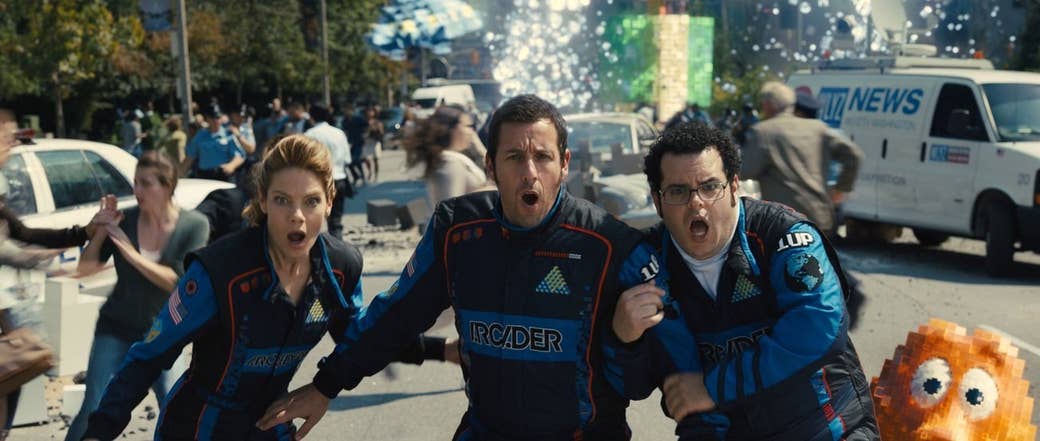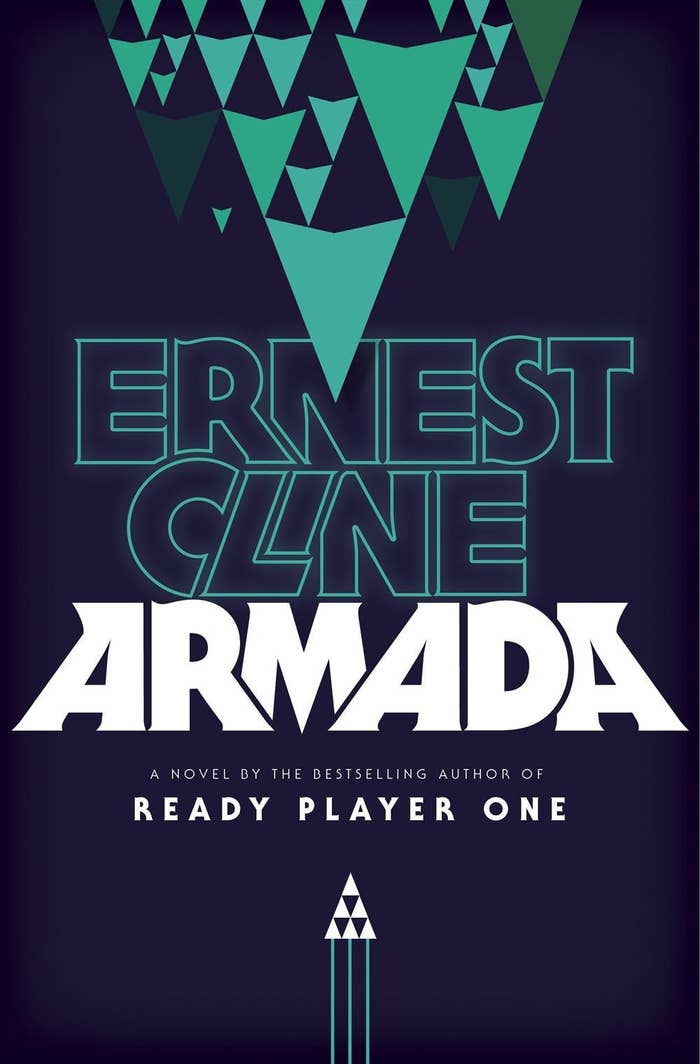
Pixels is about how Adam Sandler saves the world from invading aliens using the skills and know-how he picked up playing arcade games.
As premises go, it isn't more outlandish than those of Sandler's other movies, in which he's played the favorite son of Satan, a guy able to control time using a magic remote control, and, nightmarishly, his own twin sister. Sandler has been turning out the high-concept, low-commitment comedies for two-plus decades, even though he seems less engaged each time — we're a long way from the anarchic energy of Happy Gilmore and Billy Madison. And there are scenes in the surreally lazy, occasionally funny Pixels in which Sandler's face slips into the exact same weary, disgruntled expression he wears in Funny People, in which he played a comedian trying to distance himself from the broad, inane films that made him famous.
The idea of extraterrestrials attacking in video game form is more than just a viral video concept that's been inflated into Sandler's latest pean to arrested development. It's having a moment, courtesy of how Pixels has intersected with the release of Ernest Cline's Armada earlier this month, a book with a strikingly similar premise. But where Pixels uses its setup of grown arcade rats as unlikely heroes for comedic action, sending Pac-Man rampaging through Manhattan and offering up a cowering Q*bert as a prisoner of war, Armada is very serious about how its 18-year-old protagonist Zack Lightman becomes humanity's savior using the skills he's built up over years of obsessive gaming.

Armada is the second novel from Cline, the author of the best-selling nerd tome Ready Player One and one of the screenwriters of Fanboys. It is a work of earnest, exhausting fandom that ties itself into influences and predecessors like Ender's Game and Star Wars with the care of an academic tract. Pixels, directed by Mrs. Doubtfire's Chris Columbus and co-written by frequent Sandler collaborator Tim Herlihy, is more like a bro in nerd's clothing, offering up a shrugging barrage of '80s references in hopes some will stick.
And yet, both end up doing the same maddening thing, which is find the point where geeky affirmation becomes barefaced pandering, and blow right past it. These are not stories about how underdog nerds save the world. They are stories in which world destruction has been carefully arranged to give its heroes a chance to prove themselves special.
Both Pixels and Armada are clear on how their protagonists' gaming skills haven't yielded real-life benefits. Brenner, the character Sandler plays in Pixels, made it to the 1982 arcade world championships before losing out to a preening, mulleted guy who's played as an adult by a very entertaining Peter Dinklage. As a grown-up himself, Brenner is divorced, installs home electronics, and isn't even a gamer anymore — but he still declares himself a nerd when he gets turned down by a customer, Violet (poor Michelle Monaghan), whom he labels a snob. "I'm an amazing kisser. All us nerds are, because we appreciate it more," he tells her.
Violet, not long after this, is revealed to be a DARPA scientist, which by any classical definition would make her the nerd, and an apparent genius one at that, given her convenient ability to whip out anti-alien weapons in little to no time. But Pixels is not about genuine nerdiness as it might pertain to someone smart, shy, or with obsessive interests. When Brenner uses that term, what he means is that he's someone who doesn't feel appropriately appreciated for who he is — that he knows he's great, and Violet should kiss him even though he admits he didn't bother to brush his teeth that morning.

As the movie unfolds, and as the aliens arrive, having interpreted the contents of an '80s NASA time capsule as a declaration of war, Brenner gets to not just be the hero but to be the man lecturing Navy SEALs on the nuances of Asteroids and getting toasted by a bar full of soldiers. "I've never been happier or more alive," he yells while shooting his way through a giant version of Centipede. He, Eddie (Dinklage), and Ludlow (Josh Gad) get custom uniforms; a gala is thrown in their honor in between alien attacks; Eddie demands Serena Williams as his date — and gets her! "I'm just a loser who's good at old video games," Brenner says, as the universe he's in assures him this is the most important thing he could possibly be.
Zack from Armada is, unlike Brenner, still a teenager, though he's also mired in '80s pop culture ephemera, thanks to his obsession with the father he never knew. Zack's eponymous game of choice is a space combat simulator at which he's become good enough to earn a top ten spot, of which he's proud while admitting the time he's put in has hurt his grades and cost him his girlfriend. Like Brenner, Zack is recruited and immediately promoted above actual soldiers when the aliens attack. He gets a nifty uniform of his own ("I actually looked pretty sharp, like an intrepid young space hero"), and while there's little time for galas in Armada, which has a much higher body count than Pixels, he arrives at base to find his favorite snacks (Lucky Charms, no milk) already laid out for him.
Like Brenner, Zack knows better than the military leaders he clashes with, and also like Brenner ("We Will Rock You"), Zack ("Another One Bites The Dust," "One Vision") takes his gaming soundtrack with a lot of Queen. The two have no interest in making games, which just emphasizes it's not authorship or the industry they're interested in — it's being the best at playing. They're both convinced they're destined for greater things, even if Brenner has longer to wait.

Pixels and Armada are descendants of movies like The Last Starfighter and War Games, Armada explicitly so. But they flail against an absence of oppression. Neither Sandler's movie nor Cline's book can really muster up an argument for its main character as a misunderstood representative from a maligned subculture, because both are set in a modern world in which gaming is a billion-dollar industry and a mainstream form of entertainment. Armada does cough up one '80s-style bully who calls Zack a "videogame nerd who can't get laid," but the story quickly counters this claim by having a military aircraft land on school grounds in front of all Zack's classmates (including his ex) to zip him away to training, where he immediately bags a fantasy girl won over by his in-game rankings.
It's a moment in which the underlying sentiment in Armada as well as Pixels shines through, and it's not actually one of geek affirmation or nerd triumph — an inarguable point in our age of Comic Con and Marvel movies, in which we're all some degree of nerdy. No, it's a more ordinary and less inclusive sort of wish fulfillment, that streak of "someday you'll be sorry" that has nothing specific to do with being a gamer or being a geek and everything to do with the feeling of deserving more respect and appreciation.

It's a recognizable human sentiment, if an unpretty one, that desire to be celebrated and rewarded for some hidden greatness that's going unrecognized — greatness that, in the case of Pixels and Armada, the main characters have conveniently achieved in their own time, the work already done. Genre fiction is filled with underdog characters who manage heroics, but those stories are about what they go on to do, strengths they find, journeys they make, the things they achieve, not the indulged hobbies they already have. Maybe it's time to give this self-congratulatory idea a rest — at least until we're ready for a story in which the only person who can save the world is one with an unprecedented ability to mainline multiple seasons of Buffy the Vampire Slayer on Netflix in a single sitting, living only off of pints of Häagen-Dazs. Then sign me up.
